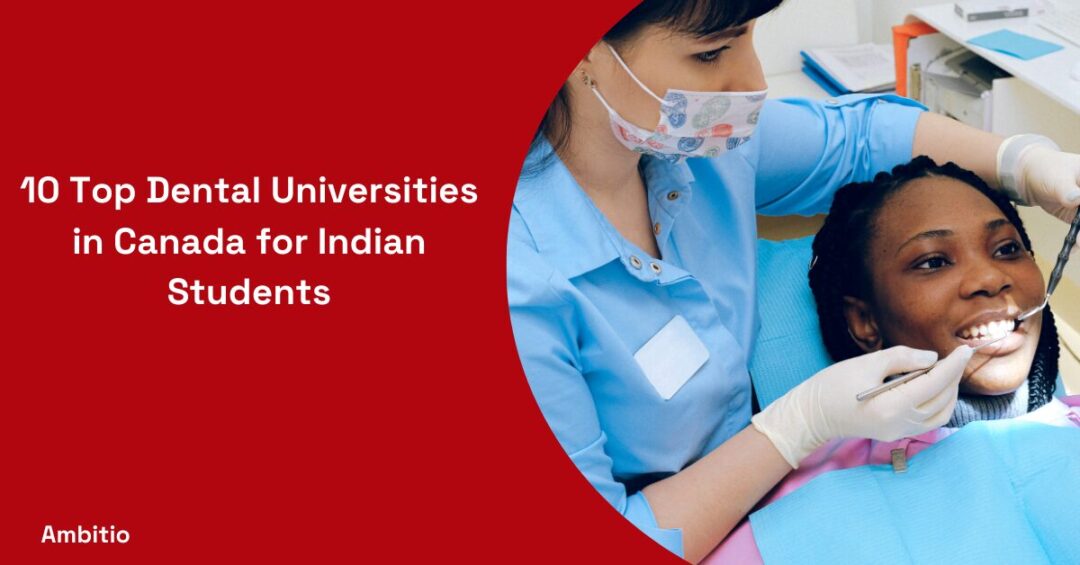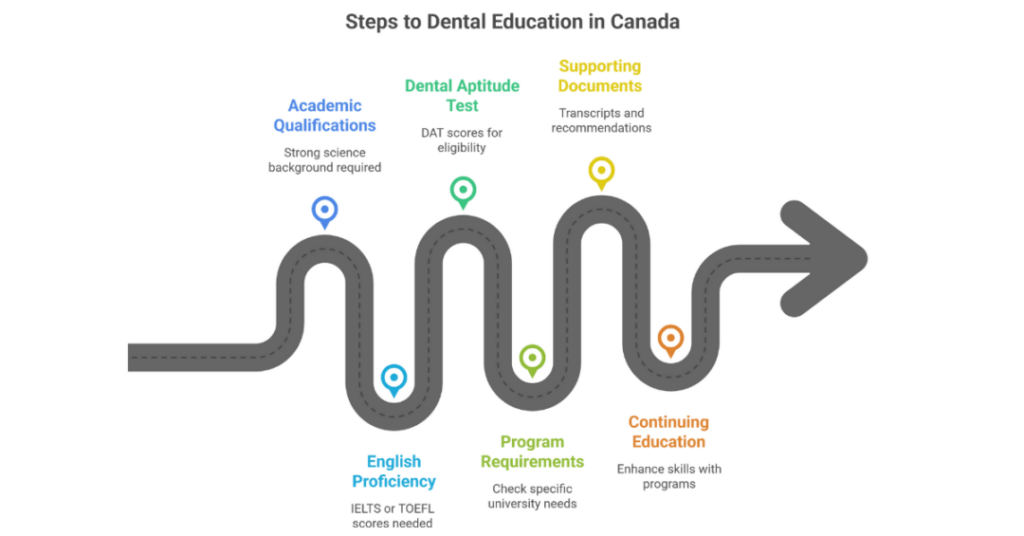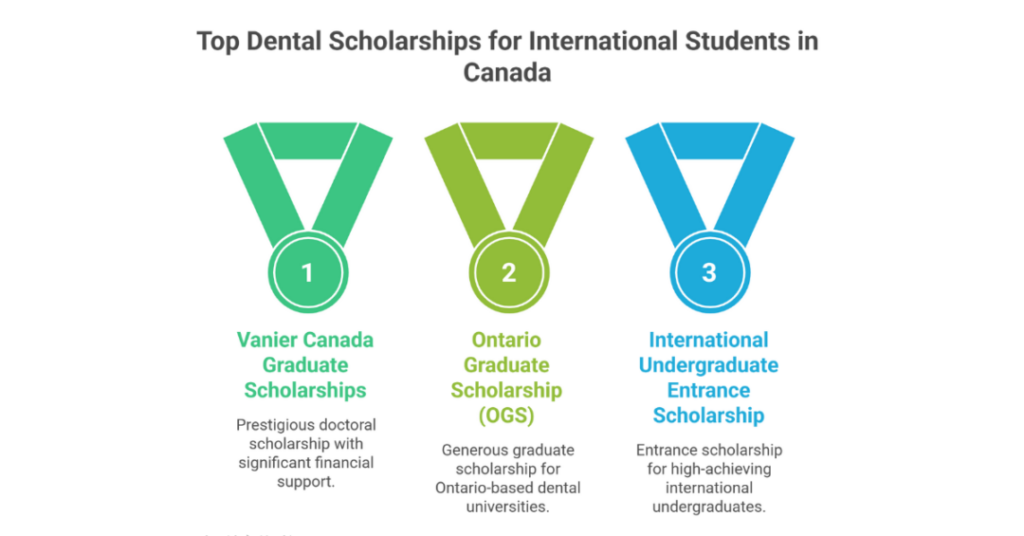21 August 2025
6 minutes read
10 Top Dental Universities in Canada for Indian Students

Key Takeaways
- Dental universities in Canada like Toronto, McGill, Dalhousie, and Alberta offer globally recognized DDS, DMD, and postgraduate programs.
- High tuition fees, strict DAT requirements, and limited seats make dentistry challenging yet rewarding for Indian students.
- Scholarships, clear eligibility planning, and strong profile building are essential for maximizing opportunities and career growth.
In 2024, 1.3 million Indian students are studying abroad, but mainly because of high tuition and stringent requirements in Canada, there are few studying dentistry there and taking the Dental Aptitude Test (DAT). Not only does studying dentistry abroad require enrollment, but preparing to be eligible, making monetary payments, and understanding career implications.
Fortunately, some of Canada’s leading dental universities, the University of Toronto, McGill University, Dalhousie University, University of Alberta, offer excellent dentistry programs in Canada that will prepare students for their future careers in dentistry, as well as in dentistry for global oral health.
Why Study Dentistry in Canada?
International students who opt for dentistry in Canada open themselves up to world-renowned dental universities in Canada that offer a dentistry degree or dentistry course at every level of study, including bachelor and undergraduate programs, postgraduate, graduate programs and a PhD in dental studies.
Some of the top universities in Canada that offer dentistry courses in Canada graduates programs in dental surgery, periodontics, pediatric dentistry, dental hygiene, orthodontics, as well as oral and maxillofacial surgery, allowing education for dentists who are trained and educated in global dental care.
10 Top Dental Universities in Canada for Indian Students
Dreaming to study in Canada and build a career as a global dentist? Canada is home to some of the best dental schools in Canada, offering world-class dental education, modern dental clinics, and multicultural learning environments.
These dental universities in Canada provide a wide range of dentistry degrees and courses, from bachelor to postgraduate and even PhD in dental studies, preparing dental students for careers in oral health sciences worldwide.
University of Toronto – Faculty of Dentistry
Recognized as one of the best dental schools in Canada, the Faculty of Dentistry offers programs like Doctor of Dental Surgery (DDS) and Doctor of Dental Medicine (DMD). With cutting-edge dental science research and advanced dental clinics, it ranks among the top universities in Canada offering professional dentistry degrees and courses.
| Detail | Information |
|---|---|
| Tuition Fees (International) | CAD 95,000 – 98,000/year |
| QS World Ranking (Dentistry) | #13 (2024) |
| Popular Programs | DDS, Dental Anaesthesia, Diploma in Dental Hygiene |
| Location | Toronto, Ontario |
| Specialization Areas | Orthodontics, Periodontics, Oral and Maxillofacial Surgery |
University of British Columbia – Faculty of Dentistry
The University of British Columbia is an institution in Canada highly ranked for dental education. Its school of dentistry integrates basic science with clinical practice, allowing patients are treated directly by dental students under supervision.
| Detail | Information |
|---|---|
| Tuition Fees (International) | CAD 91,000 – 95,000/year |
| QS World Ranking (Dentistry) | #25 (2024) |
| Popular Programs | Doctor of Dental Surgery, Graduate Programs in Oral Health Sciences |
| Location | Vancouver, British Columbia |
| Specialization Areas | Pediatric Dentistry, Periodontics, Oral Health Sciences |
McGill University – Faculty of Dental Medicine and Oral Health Sciences
McGill University is among the top universities and colleges in Canada for dental education. The faculty of dental medicine is known for offering dental studies at every study level, from bachelor of science to postgraduate diploma and advanced diploma programs.
| Detail | Information |
|---|---|
| Tuition Fees (International) | CAD 50,000 – 55,000/year |
| QS World Ranking (Dentistry) | #35 (2024) |
| Popular Programs | Doctor of Dental Medicine, PhD in Dental Sciences |
| Location | Montreal, Quebec |
| Specialization Areas | Oral and Maxillofacial Surgery, Periodontics, Orthodontics |
Dalhousie University’s Faculty of Dentistry
Dalhousie University’s Faculty of Dentistry provides hands-on training where students are taught in real dental clinics. It’s one of the most affordable colleges in Canada for dental courses in Canada, particularly attractive for international students.
| Detail | Information |
|---|---|
| Tuition Fees (International) | CAD 48,000 – 52,000/year |
| QS World Ranking (Dentistry) | #51-100 (2024) |
| Popular Programs | DDS, Diploma in Dental Hygiene, Postgraduate Programs |
| Location | Halifax, Nova Scotia |
| Specialization Areas | Pediatric Dentistry, Dental Anaesthesia, Oral Health Sciences |
Western University – Schulich School of Medicine & Dentistry
Western University’s Schulich School of Medicine is one of the top dental universities in Canada. Known for rigorous admission requirements for dental programs, it offers dentistry courses in Canada designed to create leaders in dental care.
| Detail | Information |
|---|---|
| Tuition Fees (International) | CAD 90,000 – 94,000/year |
| QS World Ranking (Dentistry) | #51-100 (2024) |
| Popular Programs | Doctor of Dental Surgery, Graduate Orthodontics |
| Location | London, Ontario |
| Specialization Areas | Oral Health Sciences, Periodontics, Dental Surgery |
University of Alberta – School of Dentistry
Located in Northern Alberta, the School of Dentistry at the University of Alberta is one of the oldest institutions offering dentistry courses in Canada. Its faculty of medicine collaborates with the faculty of dentistry offers advanced training in dental studies.
| Detail | Information |
|---|---|
| Tuition Fees (International) | CAD 83,000 – 86,000/year |
| QS World Ranking (Dentistry) | #101-120 (2024) |
| Popular Programs | DDS, Dental Hygiene, PhD in Dental Sciences |
| Location | Edmonton, Alberta |
| Specialization Areas | Periodontics, Dental Anaesthesia, Oral and Maxillofacial Surgery |
University of Saskatchewan – College of Dentistry
The College of Dentistry at Saskatchewan emphasizes cross-border study opportunities for international students. With strong dental education programs, it remains one of the colleges in Canada offer comprehensive dental studies.
| Detail | Information |
|---|---|
| Tuition Fees (International) | CAD 65,000 – 70,000/year |
| QS World Ranking (Dentistry) | #151-200 (2024) |
| Popular Programs | DDS, Diploma in Dental Hygiene |
| Location | Saskatoon, Saskatchewan |
| Specialization Areas | Orthodontics, Pediatric Dentistry, Oral Health Sciences |
University of Manitoba – College of Dentistry
University of Manitoba provides dental courses in Canada focused on dental care and oral health sciences. Students are also exposed to practical experiences through dental clinics.
| Detail | Information |
|---|---|
| Tuition Fees (International) | CAD 57,000 – 61,000/year |
| QS World Ranking (Dentistry) | #151-200 (2024) |
| Popular Programs | DDS, Graduate Programs in Dental Science |
| Location | Winnipeg, Manitoba |
| Specialization Areas | Oral Surgery, Dental Anaesthesia, Periodontics |
University of Winnipeg – Pre-Dental Programs
While not a full dental school in Canada, the University of Winnipeg offers undergraduate programs and bachelor of science pathways for those who want to study dentistry before transferring to a dental school.
| Detail | Information |
|---|---|
| Tuition Fees (International) | CAD 18,000 – 22,000/year |
| QS World Ranking (Dentistry) | N/A (Pre-Dental Only) |
| Popular Programs | Bachelor of Science (Pre-Dental Stream) |
| Location | Winnipeg, Manitoba |
| Specialization Areas | Pre-Dental Hygiene, Oral Health Sciences |
Thompson Rivers University – Pre-Dental Studies
Thompson Rivers University is another institution in Canada offering undergraduate programs that serve as a stepping stone into top dental universities in Canada. It is an excellent best match for students interested in studying foundational dental science.
| Detail | Information |
|---|---|
| Tuition Fees (International) | CAD 19,000 – 23,000/year |
| QS World Ranking (Dentistry) | N/A (Pre-Dental Only) |
| Popular Programs | Bachelor of Science (Pre-Dental Stream), Advanced Diploma Options |
| Location | Kamloops, British Columbia |
| Specialization Areas | Basic Science, Pre-Dental Hygiene, Oral Health Foundations |
Admission Requirements for dental courses in canada for Indian Students
Canada is one of the top destinations for aspiring dentists, with world-class dental universities in Canada offering structured pathways for international students.

To make the most of education in Canada, Indian students must meet the latest entry requirements and carefully review the eligibility criteria for each program.
- Academic Qualifications
Most universities require strong academic performance in science subjects. Programs like Bachelor of Dental Hygiene or dental science diplomas demand a background in biology, chemistry, and physics. - English Language Proficiency
Since education in Canada is primarily in English, IELTS or TOEFL scores are mandatory. Meeting the latest entry requirements ensures your application remains competitive. - Dental Aptitude Test (DAT)
Many institutions require DAT scores as part of the eligibility criteria. This test allows students to showcase problem-solving, reasoning, and science knowledge. - Program-Specific Requirements
Some universities, like the University of Lethbridge, may require prerequisite coursework or interviews. Always check and filter your results carefully before applying. - Supporting Documents
Transcripts, letters of recommendation, and a statement of purpose are essential. These documents help dental universities in Canada evaluate your readiness for advanced dental education. - Continuing Education & Upgrades
For professionals seeking to enhance skills, Canada also offers continuing education programs. These are especially valuable for graduates wanting to expand their expertise.
Cost of Studying at Dental Universities in Canada
Pursuing a degree at dental universities in Canada is a significant investment, and understanding the overall costs helps students plan better. These expenses usually include tuition fees, accommodation, living costs, and additional charges like health insurance and study materials.
| Expense Category | Average Annual Cost (CAD) | Description |
|---|---|---|
| Tuition Fees | 45,000 – 95,000 | Core academic fees charged by dental universities in Canada |
| Accommodation | 8,000 – 15,000 | On-campus or off-campus housing, depending on location |
| Living Expenses | 10,000 – 12,000 | Food, transport, utilities, and personal costs |
| Health Insurance | 600 – 1,000 | Mandatory coverage for international students |
| Books & Materials | 1,500 – 3,000 | Includes dental equipment, lab coats, and textbooks |
| Miscellaneous Costs | 1,000 – 2,000 | Recreation, internet, mobile, and other expenses |
Scholarships for International Students in Dental Programs
Many dental universities in Canada offer scholarships to support international students pursuing dental studies.

These awards help reduce the financial burden by covering tuition fees, research support, or living expenses.
| Scholarship Name | Offered By | Value/Benefits | Eligibility |
|---|---|---|---|
| International Undergraduate Entrance Scholarship | Various dental universities in Canada | CAD 2,000 – 10,000 | High academic achievement at entry level |
| Faculty of Dentistry International Student Scholarship | Dental faculties across Canada | Partial tuition coverage | Enrolled international dental students |
| Vanier Canada Graduate Scholarships | Government of Canada (open to dental PhD students) | CAD 50,000 per year for 3 years | Doctoral-level students with research excellence |
| Canada Graduate Scholarships – Master’s Program (CGS-M) | Canadian institutions | CAD 17,500 for 1 year | Master’s students in health-related fields |
| Ontario Graduate Scholarship (OGS) | Ontario-based dental universities in Canada | CAD 5,000 per term (up to CAD 15,000/year) | Graduate-level international students with strong academics |
Career Opportunities After Graduation
Graduating from dental universities in Canada opens diverse career opportunities across clinical practice, research, and academia. International graduates can pursue roles as general dentists, or specialize in fields like orthodontics, periodontics, and oral surgery.
Many work in private practices, community dental clinics, or hospitals, while others contribute to dental education and research. With global recognition of Canadian dental qualifications, graduates also explore opportunities abroad, enhancing their career prospects and contributing to advancing oral health care worldwide.
Conclusion
Pursuing dentistry at top dental universities in Canada is more than just earning a degree; it’s about building a career that commands respect and global opportunities. But standing out among thousands of international applicants takes more than grades; it requires a well-crafted profile that reflects your true potential. That’s where Ambitio comes in.
From personalized profile building to end-to-end study abroad guidance, we help you transform your dream into a clear, achievable path. Ready to begin your journey? Let’s build your future together with Ambitio Elite, the partner every aspiring dental professional deserves!
FAQs
What are the admission requirements for dental programs in Canada?
Admission requirements may vary, but they often include completing prerequisite courses, submitting DAT scores, and meeting GPA criteria.
Are there specialized dentistry programs in Canada?
Yes, Canadian universities offer specialized programs in areas such as pediatric dentistry, oral surgery, and orthodontics.
Can international students study dentistry in Canada?
Absolutely! Canadian universities welcome international students and offer comprehensive support for their education and career goals.
Are there opportunities for continuing education in dentistry in Canada?
Yes, many Canadian universities have faculties of dentistry that offer graduate programs and continuing education for dental professionals.
What is the Dental Aptitude Test (DAT), and how can I prepare for it?
The DAT is an important part of the application process. It assesses your academic and perceptual abilities. Preparation typically involves studying biology, chemistry, and manual dexterity skills.

You can study at top universities worldwide!
Get expert tips and tricks to get into top universities with a free expert session.
Book Your Free 30-Minute Session Now! Book a call now




























